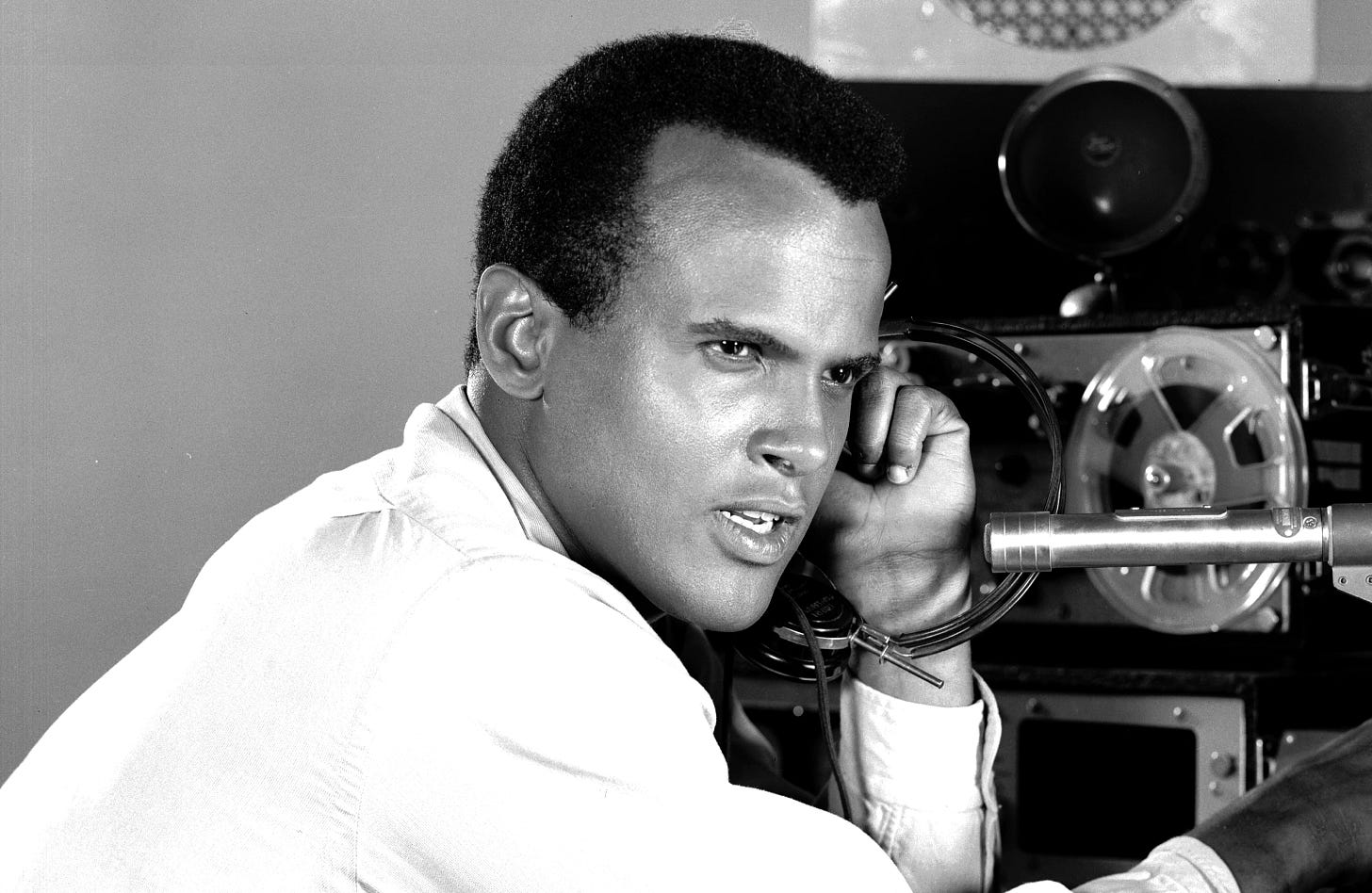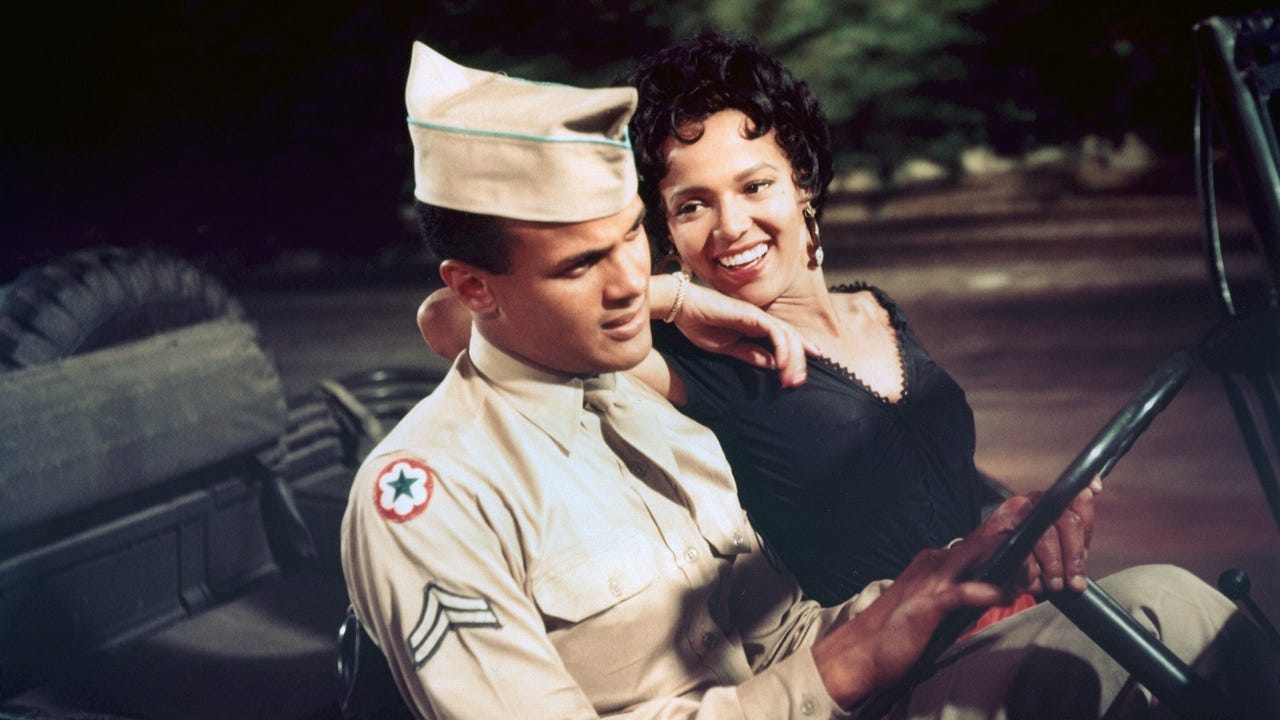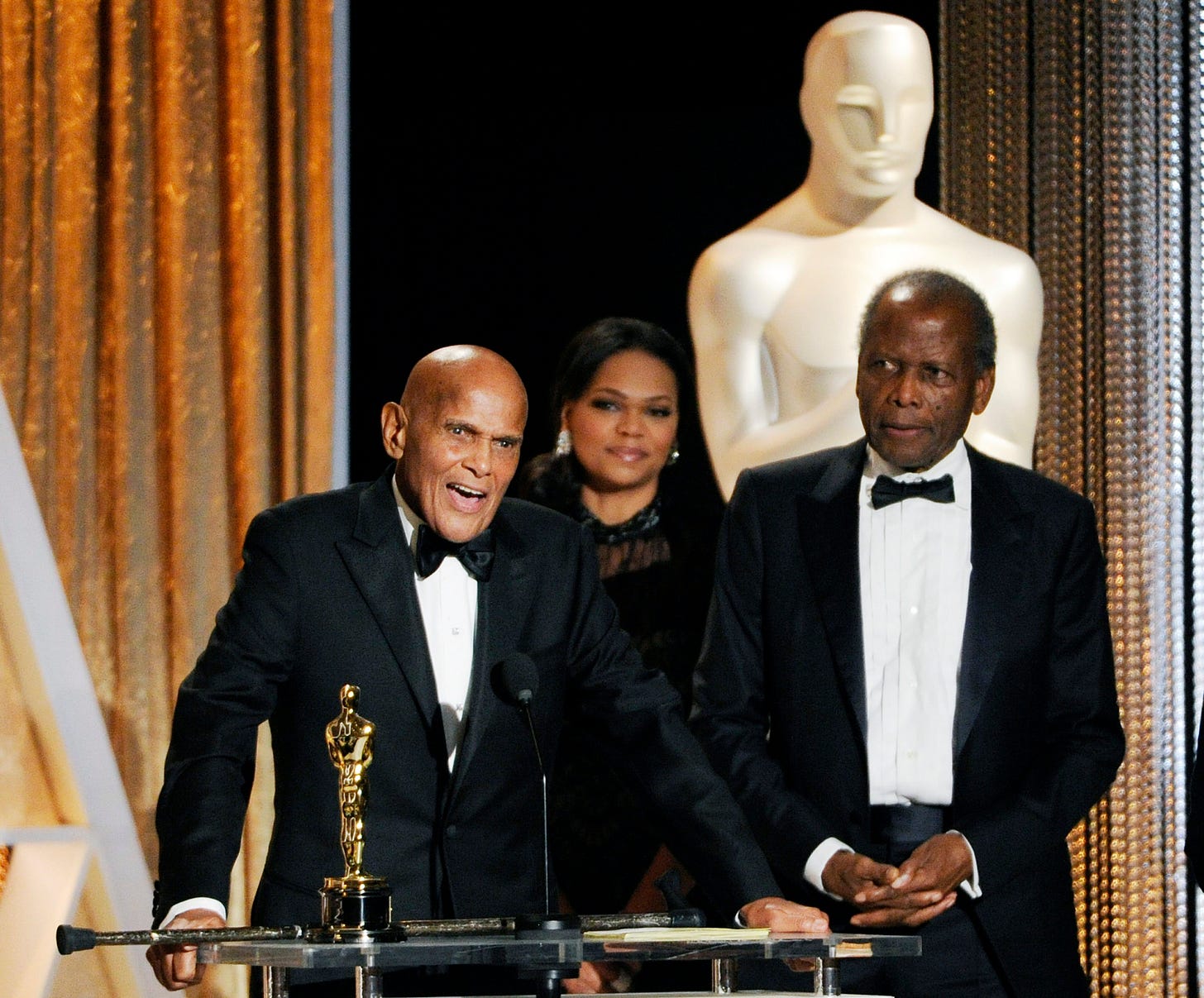How Harry Belafonte Improved the World Through His Remarkable Gifts
Remembering The Iconic Luminary’s Long and Inspiring Life (1927–2023)
Image: Turner Classic Movies
On April 25th, we mourned the loss of a rare and precious soul.
Notoriety like his only comes along once in a hundred years, leaving an unforgettable mark felt by people from all over.
A legendary figure whose light burned bright in Hollywood and whose humanitarianism stretched across the globe:
The late, great Harry Belafonte.
It’s hard for me to express what Belafonte meant to me, how he inspired my passion for Black cinema, and why he is so valued by so many.
I grew up in the 1970s when Hollywood experienced its second golden age of macho blonde straight white men with rugged beards and winning smiles.
Lee Majors (The Six Million Dollar Man) exhibited extraordinary strength on TV, and Robert Redford (The Sting) dazzled us with his undeniable charm on the silver screen.
Belafonte, however, was unlike anything Hollywood had seen before. He regaled us just as much as they did, but his performances represented a fresh and electrifying change.
Image: 20th Century Fox
Barrier-Breaking Performances
As Black parents with impressionable daughters, my mom and dad didn’t subscribe to the homogenized view of reverence.
In my household, two men in Hollywood exemplified the qualities of nobility and grace, defining what it means to be honorable Black men: Sidney Poitier and Harry Belafonte.
Poitier became a formidable leading man, and Belafonte broke barriers in and outside of Hollywood.
Belafonte began his film career in Gerald Mayer’s 1953 film Bright Road, about a school teacher and a principal who refuse to give up on a troubled student.
Then, in 1954, Otto Preminger’s Carmen Jones gave him a chance to flex his immeasurable talents and prove to Hollywood that he was a capable leading man.
This dashing Black gentleman wowed audiences with irresistible charisma and an alluring singing voice, making it impossible to overlook him.
Dorothy Dandridge, Pearl Bailey, and Belafonte star in Otto Preminger’s majestic musical featuring an all-Black cast, the first of its kind.
It’s adapted from Oscar Hammerstein’s 1943 Broadway musical of the same name.
I vividly remember when I experienced this historic, divine opera for the first time.
My love for movies was just beginning to blossom, and watching Carmen Jones was like being transported to a parallel universe filled with beautiful Black people.
Even at a young age, I could understand the importance of what I witnessed.
I was spellbound by Dandridge’s beauty, enamored by Bailey’s singing, and captivated by Belafonte’s bravado.
The entire cast represented a stunning display of Black excellence that forever shifted something in me. I truly felt my love of film and my pride in my Black identity represented on the silver screen.
The United States National Film Registry selected Preminger’s illustrious film for preservation in 1992 for being "culturally, historically, or aesthetically significant."
Carmen Jones remains the gold standard by which they immortalize Belafonte in Hollywood.
Image: Del Ray Records
Uncompromising Musical Genius
Belafonte was a swaggering force destined to become a movie star. However, Tinseltown had other plans.
Following the success of Carmen Jones, filmmakers offered Belafonte roles that he considered racially stereotypical, so he went a different route to make his mark.
The renowned singer concentrated on music and released Calypso, the first LP to reach one million copies in sales. It also topped the Top 100 album list for 31 consecutive weeks.
The album’s biggest hit, “Banana Boat Song,” contains the lyrics he's most remembered for, “Day-O.”
The King of Calypso singer never compromised his integrity or pride.
For example, he refused the role of Porgy in Preminger’s Porgy and Bess, and as a result, they cast Sidney Poitier in the role.
Despite the rivalry, Belafonte and Poitier were and continued to be best friends until Poitier’s death in 2022.
Image: PBS
Devoted Civil Rights Leader
Belafonte rejected Hollywood’s narrow view of him, instead channeling his fiery passion into the Civil Rights Movement.
He was a trusted adviser and key strategist for Martin Luther King Jr., and while Belafonte is most associated with his partnership with King, he devoted his life to defending the rights of others across the globe.
Belafonte ardently supported the fight against Aids, serving as a member of AmfAR's Board of Trustees from 2005 to 2018.
He also staunchly opposed apartheid in South Africa, releasing his last album, “Paradise in Gazankulu,” which detailed the plight of South Africans living under the racist policy.
With an unwavering sense of conviction, he always fought to empower people, granting them the courage to fight for a brighter, more just future.
Image: Associated Press
An Indelible Mark on the World
The personal stories of those who experienced his kindness, brilliance, and bravery first-hand reveal how distinguished he and his work truly were.
Here are a couple of touching tributes from well-known figures that illustrate the scope and breadth of Belafonte’s lifelong activism.
“Soon the world was simply wild about Harry and how he worked to circulate and elevate the breadth of African diasporic talent and culture. Talent like Miriam Makeba. Shattering walls in television and films. Encountering resistance but neither stopping nor caving.” — Candace Allen via The Guardian
“He was an American but an internationalist — a man of the world. He was in Africa, he was in Cuba, he was in eastern Europe. Harry’s reach was global — he was world famous. His drive was incredible. He didn’t stop until he dropped.” — Steve McQueen via The Guardian
Shari Belafonte, his daughter, speaks about her father and the lasting effects of his and Poitier's work throughout the decades.
"They both focused on making this world a better place for all people, not just people of color.” — Shari Belafonte via People.com
And in Belafonte's own words:
“I’ve often responded to queries that ask, ‘When as an artist did you decide to become an activist?’ My response to the question is that I was an activist long before I became an artist. They both service each other, but the activism is first.” — Harry Belafonte quoted by CNN
Wendell Pierce (The Wire) sums up how most of us feel about Belafonte’s treasured legacy.
Belafonte sacrificed everything so that others may freely live. His beautiful soul is at peace, thankful for what is good and pure, and praying for what still needs mending.
I am forever grateful for the precious gifts he shared with the world.
May his grieving family find solace, and may contemporary trailblazers continue his valiant work.
Are you curious to know more about other Black cinematic mavericks?
Learn how a fearless pioneer became the superhero of independent film.
Remember to subscribe and spread the word! The latest edition of Genre Mash-Up arrives next week.









